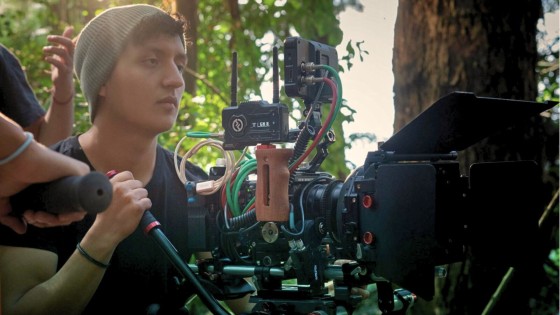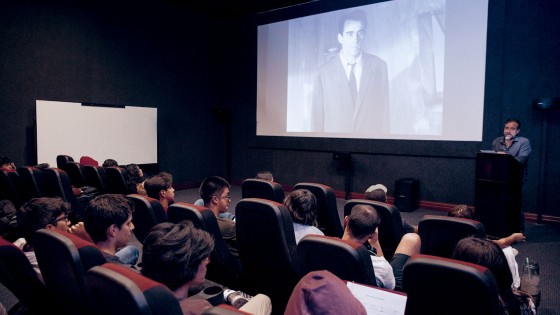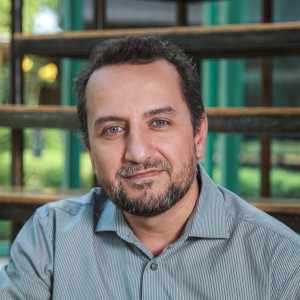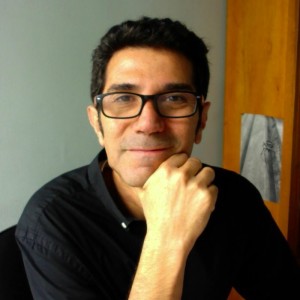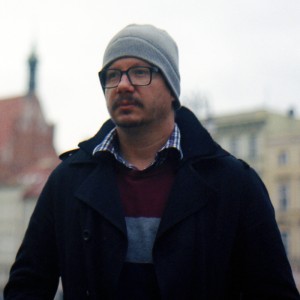Film
"You imagine it, you write it, you film it"
Film
The Film program focuses on the techniques, theories, production, and distribution processes of contemporary documentary, fiction, series, and audiovisual formats. Based on these concepts, the program focuses on practical content for the creation of audiovisual stories through individual techniques for each area of cinema, such as: audiovisual language, editing, script, directing, camera management, lighting, management sound, creative production, and post-production. In addition to the technical education, the program also focuses on the theoretical, critical, aesthetic, and analytical aspects of cinema and new media, understood as language and discourse. The program prepares individuals to be qualified professionals in all areas of film and series production, as well as in its marketing, exhibition, and distribution at local, regional, and international levels. The program includes two fields of study or emphasis that cover contemporary ways of understanding cinema and audiovisual aspects: 1. Fiction and Documentary and 2. Series and New Media.
Advantages
- Choosing the Film major at USFQ is choosing to be part of a field that has made history in Ecuador. Students, alumni, and professors have been part of the development of local cinema in films such as Ratas, Ratones y Rateros (Rats, Mice, and Thieves), Crónicas (Chronicles), Qué tan Lejos (How Far), Mete Gol Gana (Score a Goal and Win), Bienvenido a tu familia ( Welcome to Your Family), Con mi Corazón en Yambo (With my Heart in Yambo), Mientras llega el Día (While the Day Comes), Esas no son Penas (Those Are Not Sorrows), Prometeo Deportado (Prometheus Deported), Mono con Gallinas (Monkey with Hens), En el Nombre de la Hija (In the Name of the Daughter), Pescador (Fisherman), Sin Otoño Sin Primavera (Without Autumn, Without Spring), Mejor no Hablar de Ciertas Cosas (Better Not to Speak of Certain Things), OchentaySiete (Eighty-Seven), Sin Muertos No Hay Carnaval (Without the Dead There Is No Carnival), Sumergible (Submersible), Feriado (Holiday), Agujero Negro (Black Hole), Alba (Dawn), La Mala Noche, (The Bad Night), among others.
- Studying Film at USFQ means being on par with local cinema. Alumni, students, and professors have received around 50 awards granted in the country: Saudade, Huaquero, El Día de la Ceniza, La Labranza Oculta, María Angula, Tan Distintos, La Leyenda de Tayos, La Voz de mi Generación, La Puta Realidad, Flores Negras, Santa Elena en Bus, Antes que Salga la Luna, Cuando Ellos se Fueron, Sumergible, Hablar Solos, TransEngabao, Julio (Saudade, Huaquero, The Day of the Ashes, The Hidden Tillage, María Angula, So Different, The Legend of Tayos, The Voice of my Generation, The Fucking Truth, Black Flowers, Santa Elena by Bus, Before the Moon Rises, When They Left, Submersible, Talking Alone, TransEngabao, Julio), among others.
- The student can choose training from the fields of script, photography, sound, editing, directing, use of equipment, production, fiction, documentary, commercials, series.
- Several graduates from recent years have been involved in feature films, documentaries, short film projects, and the organization of film festivals and shows across the country.
- USFQ - SONY Agreement: USFQ is the only university in Ecuador that has signed a strategic alliance with SONY to promote the use of cutting-edge technology in the education sector. The objective is to allow academic projects of the Film program to benefit from the most advanced audiovisual technology. Through this agreement, the USFQ community will have access to equipment, technical advice, and continuous training from Sony's offices in Miami.
- MOMAV: Every year, the Film major organizes the Audiovisual Market Model. MOMAV is a meeting and learning space for students from different schools of cinema, video, television, and animation, and professionals from the audiovisual industry. MOMAV 2018 included talks, panels, and workshops with national and foreign guests. The most prominent of these were the creators and screenwriters of the award-winning Spanish Netflix series "Money Heist”. During the last MOMAV, a student animation project was chosen for development by Touché Films.
- The film and video projects created by students enter, each year, in festivals and film shows around the world, as well as receive invitationsto participate in and being award winners in festivals such as:
- Festival de Cine Documental Encuentros del Otro Cine-Ecuador.
- Festival de Cine y Video Universitario de los países Andinos-Ecuador.
- Festival La Orquídea-Cuenca.
- Buenos Aires Talent Campus (BAFICI)-Argentina.
- Locarno Film Festival- Switzerland.
- Festival Internacional de Video Santa Cruz de la Sierra- Bolivia.
- Festival de Cortometrajes Andinos-Perú.
- Latin American Film Festival – Sydney, Australia.
- Muestra de cine Ecuatoriano-Washington, USA.
- Muestra de cine Ecuatoriano-Barcelona, España.
- Museo del Barrio –NY, USA.
Professional field
At the end of the program, film professionals will be able to:
- Produce their own audiovisual projects and create content for film circuits or streaming platforms.
- Work on filming that functions under the mechanisms of fiction such as TV commercials, video clips, soap operas, feature films, and short films.
- Perform as assistants in any of the technical areas of cinema: production, directing, script, sound, lighting, camera, or set design.
- Work in making documentaries for television, for companies or in personal projects.
- Work at festivals and film shows in the areas of production, programming, or communication.
Testimonials
Testimonials of Our Graduates:
"I currently develop my own film projects. In 2009, I was one of the winners of the 2009 Session of the National Council of Cinematography in the category of 'Fiction Feature Film Production' with my project 'SAUDADE'. Education in film and video at COCOA helped me stimulate my interest in the different areas that make up this art. I think it is important that, although it is a degree, it has an open curriculum, which means that you can choose other courses from other degree programs, such as arts, philosophy, photography, administration, or even cooking, if you want. That opens up the spectrum a little and opens up the way your head thinks a little. I went that way and I think I managed to complement the technique that is taught very well. Also, being a student of most of the professionals who actively work in the film industry in the country, assisted me professionally in a direct way: it is good to have people who teach you while producing their own projects actively. I believe that this education has led me to take charge of my own projects."
Juan Carlos Donoso
“Studying at COCOA was the best option to apply my love and passion for audiovisual content. The combination of the theoretical vision regarding history, foundations, and social impact, plus the practical and field aspects, helped me obtain an attractive profile for the my professional field.”
Daniela Piedra
“My experience studying the degree was very gratifying: I was fortunate to attend a school that planted the idea of pursuing audiovisual studies within me; then I was able to join this university where I could explore what I liked, always helping me to improve my ideas and my stories. I learned to work as part of a team, and above all learned not to give up. As for the professional impact, it helped me to forge myself in various fields and to keep my options open, exploring different professional options. Being able to work with my professors opened many doors for me, it taught me how to manage clients and accounts, and to always continue learning and improving.”
David Ibarra
Comments from our teachers:
"The Film program is a space of continuous work and camaraderie. Making cinema is seeing oneself, seeing the world, and at the same time working as a team among young people who seek to express themselves through audiovisual elements. Making cinema is having something to say about life and about society, it is a creative, communicational, and professional act at the same time that resembles a dream, but in waking, something like dreaming, but with your feet on the ground."
Armando Salazar, Film and Video Coordinator
“Storytelling has been a primary human need since the beginning of time. Each step that we have taken as a species and even the most remote corner of our memory has been constructed in a narrative way: in the form of stories. The possibility of being just a 'click' away from any type of content has allowed the episodic narrative, or series, as we commonly know them, which have become one of the most powerful and sophisticated tools used by filmmakers in today to tell stories. With the new concentration of series and new media from the USFQ Film program, we not only align ourselves with the most lucrative audiovisual activity with the largest job offer in the audiovisual industry, but we also give our students the opportunity to tell their stories through a powerful form of artistic expression and avant-garde cinematographic values, through which their voices can be heard anywhere in the world.”
Santiago Paladines, Film professor
Academic Faculty
Scholarships

